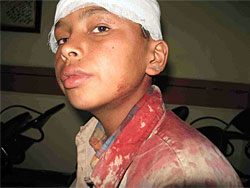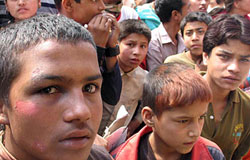|
|
This is the face our nation today: bleeding but yet inspiring. Walk on the streets with the demonstrators, help them defy the curfew and the rest will be easy.
The power of people literally made sense to me today as I took to the streets without a curfew pass. But running away from the hawkeyed gun-toting soldiers and armed police on the road and an army helicopter hovering above is not an adventure for every day. Reaching Pulchok, the masses of protestors protected me and others who were coming onto the streets.
An incomplete Machindranath chariot lay still, locals beside it praying that nothing unpleasant would happen. The mass of about 1,000 protesters moved ahead near the Lalitpur sub metropolitan office. Awaiting them were more than 100 armed police and five pickup vans ready to arrest and cart away protesters, which at first intimidated the crowd. But they quickly lost all fear and screamed anti-king slogans at the cops. "Gyanendra\'s proclamation is nothing but deceitful," people shouted.
In his speech Friday, the king said he would return power to the people by calling on the opposition seven-party alliance to name a prime minister and form a new cabinet. While the poorly informed international community (so adept at quickly releasing statements for any reason) welcomed the king\'s move and the parties hesitated unsure how to react, the ordinary people on the streets quickly ridiculed his offer.
"Is this his symbol of handing back power to the people? Look at me!" says Gopal Bhujel with frustration, revealing his arms and back severely bruised with the clear marks of police batons. This infuriated his fellow protesters
near the Bagmati Bridge where a large number of heavily armed soldiers were on guard with armoured vehicles, police vans and army jeeps.
Taking the right-hand road, the demonstrators moved ahead towards Kathmandu\'s Tripureswor neighbourhood but then a large group of youths ran towards us shouting, "The army is shooting from a helicopter. Run!"
We scattered and quickly learned that more than 30 protesters were injured after being shot with rubber bullets, baton charged and sprayed with teargas. Witnesses said that security force fired randomly in the nearby Thapathali area, even at the Maternity and Norvic hospitals.
By the time, we reached Norvic, doctors were busy treating the injured demonstrators free of cost. "Don\'t worry about me, I\'m fine," said 15-year-old Suman Khatri, whose head was bleeding. He was quickly bandaged but blood was still dripping all over his shirt. "The king has to give up if he really cares for his people and country," said the boy, infuriated but equally calm.
"I\'m going to rest tonight and then I\'m on the street tomorrow," he added as the crowd of people around him, hospital staff and demonstrators, broke into a huge round of applause.
Norvic Hospital was filled by more than 500 protesters who arrived to check on their injured friends. Its halls echoed with songs and chants against the king. In one corner, hundreds gathered around a tiny radio to listen to news. Another group went to a nearby restaurant, which had opened to serve tea for demonstrators who watched live CNN and Kantipur news. "Hey, look that\'s us. Wow!" all shouted enthusiastically.
"All we wanted to do was make a peaceful demonstration but the government is back to being repressive and using all its force to shut us up," said protester Gobinda Sitaula. "So, this is the king\'s offer. Very funny," he added.
Gathering speed
The movement picks up support from all quarters, even the hungry
NARESH NEWAR
|
|
| FATHER\'S SONS: Young boys don\'t want any human rights issue raised on their behalf, especially regarding criticism by rights workers not to allow children walk side by side with adult demonstrators. "My father was beaten up. I have every right to be here," says 16-year old Shiba Ram. |
"Stop those stupid questions," snaps one of his friends, irritated at being disturbed while trying to listen to student leader Gagan Thapa, who is mesmerising a crowd of more than 1,000 protestors with his satirical anecdotes about King Gyanendra and his royal ministers.
"We don\'t fear these cops, soldiers or the king anymore," says a young girl, Sabitri, who quickly moves to lead a group of female demonstrators. "Nothing can stop us now-this is the people\'s movement," a housewife shouts as she and 50 other women follow Sabitri.
Barely two weeks ago, right after the seven political parties announced the indefinite general strike and mass protests, many thought that this opposition would not last for more than a few days after hundreds of demonstrators were arrested, baton-charged and some even shot by security forces. But the number of protesters on the streets country-wide is growing daily and they show no signs of being intimidated despite the latest toll: over 3,000 arrested, 1,000 injured and hospitalised and 10 killed.
The police look tired of running after them. "What\'s the use? They will come back again," says an exhausted constable after making numerous charges at the crowd with his fellow cops only to see the protesters return again and again to Kathmandu\'s Balaju area.
 Female demonstrators took the lead in Gongabu for the first time in the last 12 days of peaceful rallies. |
The movement has gained such momentum that the Maoists have claimed that they are playing a significant role. And its heat is being felt in the government, whose own workers are now openly supporting loktanta (people\'s democracy). "It\'s now almost time to protest in silence. Please excuse us," says a senior official at the Nepal Oil Corporation as he and his friends gather in their meeting room to tie black bands on their arms.
While the parties are planning strategy, common people are filling the streets to demonstrate, with or without leaders. "There is no leader here, the strength of the people is leading everyone," says a middle-aged woman in the capital\'s Gongabu neighbourhood, pulling a grey shawl over her shoulders and shouting at male protesters to go to the front of the crowd to break through the line of armed police blocking their way.
"Will you let us pass, young man?" an old woman in a red sari asks a cop. "Well, we asked you once, now watch us pass," says another female demonstrator who, with her friends pushing from behind, forces her way through the normally baton-swinging police.
 With women in front, the demonstrators break free and head towards Samakosi. |
The cops watch helplessly as the women and girls smile in triumph. Their demonstration is so peaceful that all the police can do is give way, then rush to their trucks to establish a new line at Samakosi the destination of hundreds of female protestors already marching down the road.
By the end of the day at Balaju not a single protestor was hurt, no stone had been thrown nor had police used their guns or batons. This was the place that resembled a war zone last week, when more than 25 protestors were injured by police fire.
But while protesters have shown restraint this week, some police are again intimidating the peaceful demonstrators. "Don\'t blame us, it\'s the civilian police who are beating up these people," says a member of the armed police.
Yet not everyone participating in the movement is happy, especially because the strike has severely affected daily life. "I\'m hungry. We have stopped eating more than once a day," says a poor porter at the Kalimati Fruit & Vegetable Market in Kathmandu. Most of his friends who usually work here have already left the capital, broke for lack of work, to walk the three days to reach their homes in Dhading.
"We don\'t want to complain as we fully support the movement and I guess we need to endure our suffering to achieve democracy," says another poor porter, Ramesh Gauli. He too plans to go home to Dhading but says he doesn\'t have enough strength to walk all the way.




